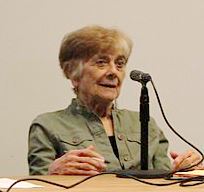Early life and education
Piven was born in Calgary, Alberta, Canada, [2] of Russian-Jewish parents, [4] Rachel (née Paperny) and Albert Fox, a storekeeper. [5] [6] Both had emigrated from Uzlyany, a shtetl near Minsk. [7] Piven's family moved to the United States when she was one. She would later become a naturalized U.S. citizen in 1953. [2]
Piven's childhood was spent in Jackson Heights, Queens, New York. She went to P.S. 148 and she exhibited rebelliousness at an early age:
In elementary school, she refused to say the Pledge of Allegiance, even after being forced to stand in a corner with her face to the wall. "I said I could only pledge allegiance to the Maple Leaf," Ms. Piven recalled. "I was a Canadian." [7]
Next, she attended Newtown High School and then went away to college in Chicago. [8] She received a B.A. in City Planning in 1953, an M.A. in 1956, and a Ph.D. in 1962, all from the University of Chicago. [2] She attended on a scholarship and waitressed for living expenses. [8] Her dissertation was directed by Edward C. Banfield. [9]
Career
Piven was married to her long-time collaborator Richard Cloward until his death in 2001. [2] Together they wrote an article in the May 1966 issue of The Nation titled "The Weight of the Poor: A Strategy to End Poverty". The article advocated increased enrollment in social welfare programs in order to collapse the system and force reforms, leading to a guaranteed annual income. [10] [11] This political strategy has been referred to as the "Cloward–Piven strategy". [12] During 2006/07, Piven served as the President of the American Sociological Association. [13]
While teaching at Boston University, she and four of her political science department colleagues, including Murray Levin and Howard Zinn, refused to return to the workplace after the settlement of the 1979 Boston University strike by the AAUP. The university's clerical and support staff had struck at the same time, but their strike was not resolved yet. Piven, Levin, Zinn, et al. refused to cross their picket line, instead holding classes elsewhere in solidarity with the unresolved strike. The "B.U. Five" were threatened with dismissal by Boston University President John Silber. [14] Silber later backed down, and Piven and the others returned to the classroom. [15] Piven eventually left Boston University for City University of New York (CUNY) at the Graduate Center.
Writings
Among Piven's major works are: [20] Regulating the Poor written with Richard Cloward, first published in 1972 and updated in 1993, it analyzes government welfare policy and how it has been used to exert power over the lower classes; [21] Poor People's Movements , published in 1977, a chronicle of rebellious social movements in the U.S. and how some were able to induce important reforms; [22] Why Americans Don't Vote, published in 1988 and a follow-up book Why Americans Still Don't Vote published in 2000, each of which look at U.S. electoral practices that tend to discourage poor and working-class Americans from exercising their right to vote; [23] [24] The War at Home (2004), a critical examination of the domestic results of the wars initiated by the Bush administration; [25] and Challenging Authority: How Ordinary People Change America (2006), a look at the interaction of disruptive social movements and electoral politics in generating the necessary political momentum for democratic reform in American history. [26]
This page is based on this
Wikipedia article Text is available under the
CC BY-SA 4.0 license; additional terms may apply.
Images, videos and audio are available under their respective licenses.

